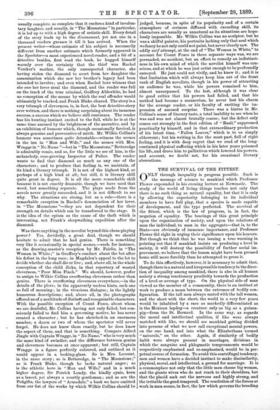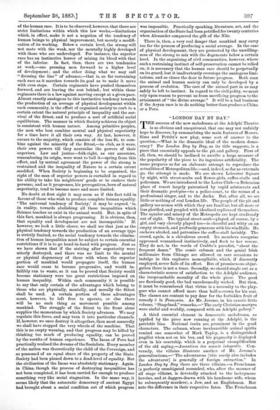THE SURVIVAL OF THE FITTEST.
ONLY through inequality is progress possible. Such is the message of science to mankind which Professor Flower expounded in his evening lecture at Newcastle. The study of the world of living things teaches not only that there is no such thing as natural equality, but that it is only by allowing the superiority belonging to its individual members to have full play, that a species is made capable of development, and the type perfected. The survival of the fittest, which is the law of progress, is, in fact, the negation of equality. The bearings of this great principle upon the organisation of society, and upon the relations of man the individual, to man in the aggregate—that is, to the State—are obviously of immense importance, and Professor Flower did right in urging their significance upon his hearers. But though we think that he was issuing a true warning in pointing out that if mankind insists on producing a level in society, it will destroy the possibility of further social im- provement, we believe that the lesson might have been pressed home still more forcibly than be attempted to press it.
To do this effectively, however, it is necessary to admit that, though there is a natural and irrepressible tendency in the direc- tion of inequality among mankind, there is also in all human society a strong reactionary proclivity towards the production of a level or average of type. On the physical side of man viewed as the member of a community, there is an instinct at work to produce a mean between the extremes of bodily con- figuration. If the tall men always mated with the tall women, and- the short with the short, the world in a very few years would be inhabited by a race as markedly differentiated as is the Mexican lapdog—a creature only as big as a guinea- pig—from the St. Bernard. In the same way, as regards the moral and intellectual qualities, if like were always matched with like, we should see mankind getting divided into persons of what we now call exceptional mental powers, on the one hand, and into what the Elizabethans termed " naturals," on the other. Again, if similarity of bodily habit were always present in marriages, divisions in which the sanguine and phlegmatic temperaments would be respectively emphasised and re-emphasised, would be in per- petual course of formation. To avoid this centrifugal tendency, men and women have a decided instinct to make dissimilarity, physical, moral, and intellectual, a ground for marriage. It is a commonplace not only that the little men choose big women, and the giants wives who do not reach to their shoulders, but that the placid seek out the nervous and highly strung, and the irritable the good-tempered. The resolution of the forces at work in man seems, in fact, the law which governs the breeding of the human race. It is to be observed, however, that there are strict limitations within which this law works, limitations which, in effect, make it not a negation of the tendency of human beings to physical improvement, but merely a modifi- cation of its working. Below a certain level, the strong will n ot mate with the weak, nor the mentally highly developed with those who are undeveloped. For instance, the superior -race has an instinctive horror of mixing its blood with that of the inferior. In fact, then, there are two tendencies at work,—one pressing men forward to a higher level of development ; and the other doing what we may call -" dressing the line" of advance,—that is, so far restraining each race as it marches towards its goal as to make it move with even steps. Certain regiments have pushed themselves forward, and are leaving the rest behind ; but within those regiments there is a law against moving except at a given pace. Almost exactly analogous to this instinctive tendency towards the production of an average of physical development within e ach community, is the effort of organised society to curb to a -certain extent the natural principle of inequality and the sur- vival of the fittest, and to produce a sort of artificial social -equilibrium. The manner in which Society achieves its object is consistent with human nature. Among primitive peoples, the men who best combine mental and physical superiority for a time have it all their own way. At last, however, it :occurs to the majority, which consists of the less fit, to com- bine against the minority of the fittest,—to club, as it were, their own powers till they neutralise the powers of their :superiors. Law and justice—folk-right, as our ancestors, remembering its origin, were wont to tall it—spring from this effort, and by mutual agreement the power of the strong is restrained and the inequality of Nature to a certain extent :modified. When Society is beginning to be organised, the right of the man of superior powers is curtailed in regard to his ability to take his neighbours' goods or to enslave their persons; and as it progresses, his prerogatives, born of natural -superiority, tend to become more and more limited.
No doubt at first sight it may seem as if this fact told in favour of those who wish to produce complete human equality. 4 The universal tendency of Society,' it may be argued, is, in reality, towards abolishing all those inequalities which Science teaches us exist in the animal world. But, in spite of this fact, mankind is always progressing. It is obvious, then, that equality and development are not incompatible.' If, however, we look a little closer, we shall see that just as the physical tendency towards the production of an average type is strictly limited, so the social tendency towards the elimina- tion of human inequalities must be subject to certain essential restrictions if it is to go hand-in-hand with progress. Just as we have shown that if the striving after superiority were utterly destroyed, and there was no limit to the mental or physical degeneracy of those with whom the superior portion of mankind would propagate itself, the human race would cease to become progressive, and would in- fallibly run to waste, so it can be proved that Society would become stationary were too great restrictions imposed on human inequality. Within each community it is possible to say that only certain of the advantages which belong to those who are physically, mentally, and morally the fittest shall be used. A certain portion of these advantages must, however, be left free to operate, or else there will be no such thing as movement possible among mankind. The straggle of the fittest to the front alone supplies the momentum by which Society advances. We may regulate this force, and may turn it into particular channels. if, however, we once destroy it altogether, then most assuredly we shall have stopped the very wheels of the machine. That this is no empty warning, and that progress may be killed by :thinking too much of producing equality, can be proved by the results of human experience. The Incas of Peru had practically realised the dreams of the Socialists. Every member of the nation was theoretically the child of the Sovereign, and so possessed of an equal share of the property of the State. -Society had been planed down to a dead-level of equality. But the civilisation of the Incas was absolutely stationary. Again, in China, though the process of destroying inequalities has not been completed, it has been carried far enough to produce something very like social stagnation. In the same way, it seems likely that the autocratic democracy of ancient Egypt had brought about a social condition out of which progress
was impossible. Practically speaking, literature, art, and the organisation of the State had been petrified for twenty centuries when Alexander conquered the gift of the Nile.
There is, then, a very real danger that mankind may carry too far the process of producing a social average. In the case of physical development, they are protected by the unwilling- ness of the strong to mix with the degenerate below a certain level. In the organising of civil communities, however, where such a restraining instinct of self-preservation cannot be relied on, it is necessary that the human race should be perpetually on its guard, lest it inadvertently oversteps the analogous limi- tations, and so closes the door to future progress. Both man the animal and human society can only be developed by a process of evolution. The care of the animal part in us may safely be left to instinct. In regard to the civil polity, we must rely upon reason to prevent us from sacrificing progress to the attainment of " the divine average." It will be a bad business if the Aryan race is to do nothing better than produce a China or a Peru.







































 Previous page
Previous page